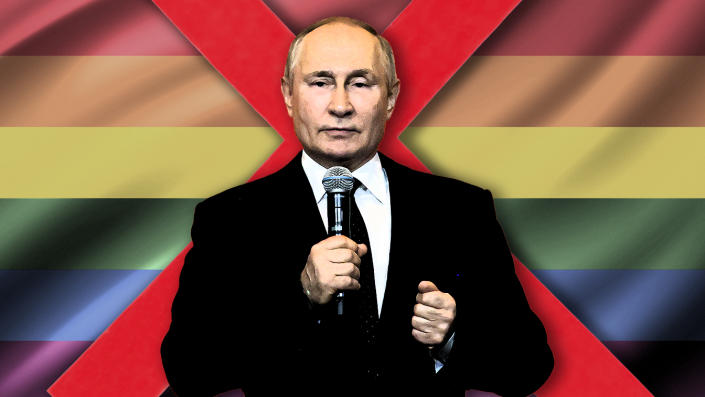Russian President Vladimir Putin has frequently used divisive culture war issues to distract from the costly and faltering invasion of Ukraine he launched in February. He did so again on Monday, with a new law supposedly intended to prevent the spread of LGBT “propaganda.”
In effect, the new restrictions make it all but impossible to discuss gay and transgender issues in Russia. The Moscow Times reported that bookstores across the capital were already removing LGBT-themed works, including the popular young adult novel “Summer in a Pioneer Tie,” about two teenage boys who fall in love at a Soviet summer camp.
“We have our own way of development; we do not need European imposition of nontraditional relations,” one Kremlin official said as the law headed for passage. It establishes criminal penalties (up to $81,000 for institutions and up to $6,500 for individuals) for the dissemination of “propaganda of non-traditional sexual relations and (or) preferences, gender reassignment, and paedophilia, as well as for disseminating, among minors, information about non-traditional sexual relations and (or) preferences or information that may encourage minors to change sex.”
Foreigners found in violation of the new rules could be expelled from Russia.
Hounded mercilessly during the era of the Soviet Union, gays and lesbians had some of their freedoms restored after Russia emerged from communism. But the period of liberalism proved short-lived, and the rise of Putin in 1999 saw Russia embrace an inflexible and militaristic form of Christian Orthodoxy aligned with state power to an unusual degree.
Patriarch Kirill, head of the Russian Orthodox Church, is a longtime foe of gay rights. He has previously sought to galvanize support for Russia’s invasion of Ukraine by raising the prospect of gay pride parades.
The ban on all LGBT-related content expands on a 2013 provision banning LGBT “propaganda” targeting minors. Neither measure explains what is entailed by “propaganda,” a loaded word in a nation where the memory of Soviet-style information campaigns remains fresh. Today, however, such campaigns are far more likely to be run by the Kremlin than by LGBT groups, many of which have been silenced, harassed and hounded out of existence, including on the internet.
Putin, Kirill and top Kremlin officials have argued that the West is using Ukraine as a sort of beachhead to launch a cultural invasion of Russia. “The solution will protect our children, the future of the country, from the darkness spread by the United States and European states,” Vyacheslav Volodin, the speaker of Russia’s Duma, or parliament, argued last month.
Though Russia once sold its Ukraine invasion as a “de-Nazification” operation, the attack has more recently been billed as a “holy war” against the West. The rhetoric of spiritual combat seems to intentionally allude to the pugilistic approach that some Christian nationalist leaders in the West, including the United States, have taken in domestic politics.




